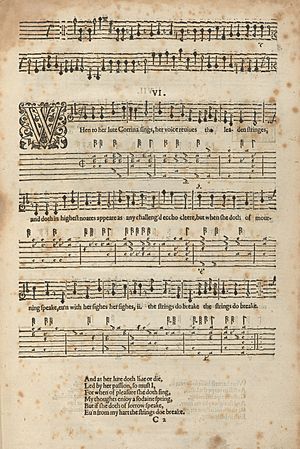Philip Rosseter facts for kids
Philip Rosseter (born 1568, died 1623) was an English composer and musician. He was also a manager for plays and shows. Rosseter lived in London by 1598. In 1604, he became a lutenist for James I of England, the king at the time. He kept this job until he died in 1623.
Rosseter is most famous for his book A Book of Ayres. He wrote this book with Thomas Campion and it was published in 1601. Campion likely wrote the introduction to the book. This introduction talked about how music should not be too complicated. It said that music should let the words be heard clearly. Rosseter and Campion were very close friends and worked together often. When Campion died in 1620, he left everything to Rosseter.
Rosseter's Music
Philip Rosseter wrote many lute songs. These songs were usually short and simple in their musical style. They often had a clear melody with chords supporting it, which is called homophonic music. His songs did not repeat much. They also did not often use word painting. This is when music tries to sound like the words, for example, a high note for "sky." Even so, his music was very creative and interesting.
Rosseter's only other book was Lessons for Consort, published in 1609. This book was for a group of instruments called a broken consort. This group included a bandora, a cittern, a lute, a flute, and two types of viol. The book had arrangements of his own music and music by other composers.
Rosseter and Theatre
Rosseter was also very involved in the theatre during the time of King James I. This period is known as the Jacobean theatre. In 1609, he and Robert Keysar became owners in a company of boy actors. This company was called the Children of the Chapel.
The company had lost their special support from the king in 1606. This happened because their plays made fun of scandals at the king's court. But Rosseter was allowed to bring back their old name. In 1610, they became the Children of the Queen's Revels.
Rosseter stayed connected to the royal court. In 1612 and 1613, he put on three plays for royal family members. These included Prince Charles and Princess Elizabeth. He also played the lute in a special show on February 15, 1613. This show was part of the celebrations for Princess Elizabeth's wedding.
Building a New Theatre
In 1614, the Children of the Queen's Revels needed a new place to perform. Their lease for the Whitefriars Theatre ended. Rosseter got permission from King James to build a new theatre. It was planned for a place called Porter's Hall.
However, the new theatre site ended up being inside the City of London's area. The city leaders, like the lord mayor, did not want a theatre there. They strongly disagreed with Rosseter's plan. After a big legal case, the court sided with the London authorities. The theatre was almost finished, but it was torn down in 1617.
Rosseter tried to keep the boy actors performing. They were now called the Children of the Late Queen's Revels. He tried to make them a touring company, meaning they would travel to different places to perform. But he stopped being an owner by 1620. The company broke up soon after that.
Rosseter's Legacy
A piece of music called Rosseter's Galliard was written by Giles Farnaby. It is found in a famous music book called the Fitzwilliam Virginal Book. This piece was probably based on one of Rosseter's own songs.
One of Rosseter's compositions was also used much later. In 1969, it was arranged by Mont Campbell. It became part of a song called 'Garden of Earthly Delights'. This song was on the album Arzachel by the rock group Uriel.
 | Jackie Robinson |
 | Jack Johnson |
 | Althea Gibson |
 | Arthur Ashe |
 | Muhammad Ali |


